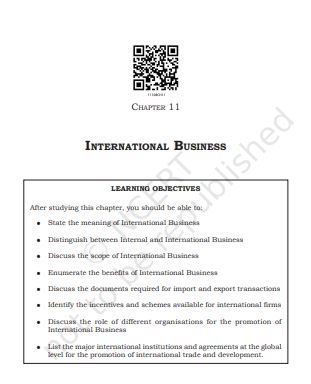‘NCERT Solutions for Class 11 Business Studies Chapter 11 International Business’ PDF Quick download link is given at the bottom of this article. You can see the PDF demo, size of the PDF, page numbers, and direct download Free PDF of ‘Ncert Class 11 Business Studies Chapter 11 Exercise Solution’ using the download button.
International Business NCERT Textbook With Solution PDF Free Download

Chapter 11: International Business
Countries all over the world are undergoing a fundamental shift in the way they produce and market various products and services.
The national economies which so far have been pursuing the goal of self-reliance are now becoming increasingly dependent upon others for procuring as well as supplying various kinds of goods and services.
Due to increased cross-border trade and investments, countries are no more isolated. The prime reason behind this radical change is the development of communication, technology, infrastructure etc.
The emergence of newer modes of communication and the development of faster and more efficient means of transportation have brought nations closer to one another.
Countries that were cut off from one another due to geographical distances and socio-economic differences have now started increasingly interacting with others.
World Trade Organisation (WTO) and reforms carried out by the governments of different countries have also been a major contributory factor to the increased interactions and business relations amongst the nations.
We are today living in a world where the obstacles to cross-border movement of goods and persons have substantially come down.
The national economies are increasingly becoming borderless and getting integrated into the world economy. Little wonder that the world has today come to be known as a ‘global village’.
Business in the present day is no longer restricted to the boundaries of the domestic country.
More and more firms are making forays into international business which presents them with numerous opportunities for growth and increased profits. India has been trading with other countries for a long time.
But it has of late considerably speeded up its process of integrating with the world economy and increasing its foreign trade and investments (see Box A: India Embarks on the Path to Globalisation).
Business transaction taking place within the geographical boundaries of a nation is known as a domestic or national business.
It is also referred to as internal business or home trade. Manufacturing and trade beyond the boundaries of one’s own country is known as international business.
International or external business can, therefore, be defined as those business activities that take place across the national frontiers.
It involves not only the international movements of goods and services but also capital, personnel, technology, and intellectual property like patents, trademarks, know-how, and copyrights.
It may be mentioned here that most people think of international business as international trade. But this is not true. No doubt international trade, comprising exports and imports of goods, has historically been an important component of international business.
But of late, the scope of international business has substantially expanded. International trade in services such as international travel and tourism, transportation, communication, banking, warehousing, distribution, and advertising has considerably grown.
The other equally important developments are increased foreign investments and overseas production of goods and services.
Companies have started increasingly making investments into foreign countries and undertaking the production of goods and services in foreign countries to come closer to foreign customers and serve them more effectively at lower costs.
All these activities form part of international business. To conclude, we can say that international business is a much broader term and is comprised of both the trade and production of goods and services across frontiers.
| Author | NCERT |
| Language | English |
| No. of Pages | 47 |
| PDF Size | 3.9 MB |
| Category | Business Studies |
| Source/Credits | ncert.nic.in |
NCERT Solutions Class 11 Business Studies Chapter 11 International Business
1. “International business is more than international trade”. Comment.
The following points will show how International business is more than international trade:
1. International business has a wider scope than international trade.
2. International trade consists of the import and export of goods and is an important part of international business, while international business encompasses many other departments.
3. International business includes services like travel, tourism, finance, banking, warehousing, insurance, etc. It also consists of foreign investment and the production of goods and services overseas.
4. International trade is done on the basis of exporting goods while international business is done by licensing, joint venture, wholly owned subsidiaries etc.
2. What benefits do firms derive by entering into international business?
Firms derive the following benefits by entering international business:
1. Firms can earn high profits by selling a product to international markets that are having low prices in the domestic market than international market rates.
2. Better growth prospects for goods that are saturated in the domestic market.
3. By expanding to international markets a firm can utilize its full capacity in producing goods and drive profits by taking advantage of economies of scale.
4. Businesses can beat high domestic competition by exploring international markets
5. Tap into long term growth by expanding into international markets.
3. In what ways is exporting a better way of entering into international markets than setting up wholly owned subsidiaries abroad.
Exporting is considered a better option than setting up subsidiaries because of the following reasons:
1. Managing an export business is relatively easy as compared to managing wholly-owned subsidiaries.
2. It needs less investment as compared to subsidiaries
3. Exporting is less risky as no equity investment is required whereas in case of subsidiaries 100% equity is beared by the company. Hence, it is responsible for all the losses in case of failure.
4. Exporting is having lower degree of political risk as compared to wholly owned subsidiaries.
Related PDFs
Business Ideas with Small Investment PDF In Hindi
NCERT Class 11 Business Studies Textbook Chapter 11 International Business With Answer PDF Free Download
